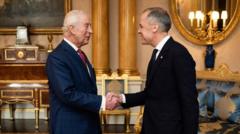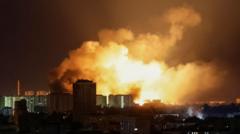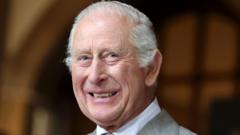This article examines how U.S. foreign policy changes under Trump's administration are influencing Israel's military strategies toward Syria amid complex geopolitical tensions.
**Trump's Shift on Syria Alters Israel's Military Game Plan**

**Trump's Shift on Syria Alters Israel's Military Game Plan**
The recent lifting of sanctions against Syria by President Trump has dramatically impacted Israel's approach to airstrikes in the region.
As the Trump administration navigates its foreign policy, a surprising pivot has been observed regarding U.S. relations with Syria. Since President Trump met with the newly installed Syrian leader, Ahmed al-Shara, and lifted sanctions against the war-torn country, military actions by Israel in the region appear to have slowed considerably.
In the recent past, Israel carried out over 700 strikes on Syrian territory, targeting positions associated with hostile factions and preventing potential threats from becoming entrenched near its borders. The airstrikes, including a notable operation just days before the meeting between Trump and al-Shara, were part of Israel's strategic focus on safeguarding its national security. Uzi Arad, a former national security adviser, emphasized the importance of these actions as lessons learned from historical conflicts, particularly from engagements in southern Lebanon.
The Israeli government has expressed concerns about the new Syrian administration, labeling it as extremist, primarily due to its links with Islamist militants. Despite these concerns, Trump's recent overture to engage with al-Shara represents a notable departure from the traditional U.S. stance on Syrian governance and stability.
Celebrations erupted in cities like Aleppo following the announcement of lifted sanctions, reflecting a shift in public sentiment toward a potential rebuilding phase in Syria. The strategic implications are profound, as Israel recalibrates its military posture in response to the evolving geopolitical landscape post-Trump's diplomatic outreach.
The diplomatic dance continues as the region watches intently; Israel's next moves remain uncertain amidst a backdrop of altering alliances and responses from neighboring nations, particularly as the Biden administration contemplates its own policy direction towards Syria. This evolving scenario poses an intriguing challenge for both Israeli defense planners and American foreign policy architects moving forward.
In the recent past, Israel carried out over 700 strikes on Syrian territory, targeting positions associated with hostile factions and preventing potential threats from becoming entrenched near its borders. The airstrikes, including a notable operation just days before the meeting between Trump and al-Shara, were part of Israel's strategic focus on safeguarding its national security. Uzi Arad, a former national security adviser, emphasized the importance of these actions as lessons learned from historical conflicts, particularly from engagements in southern Lebanon.
The Israeli government has expressed concerns about the new Syrian administration, labeling it as extremist, primarily due to its links with Islamist militants. Despite these concerns, Trump's recent overture to engage with al-Shara represents a notable departure from the traditional U.S. stance on Syrian governance and stability.
Celebrations erupted in cities like Aleppo following the announcement of lifted sanctions, reflecting a shift in public sentiment toward a potential rebuilding phase in Syria. The strategic implications are profound, as Israel recalibrates its military posture in response to the evolving geopolitical landscape post-Trump's diplomatic outreach.
The diplomatic dance continues as the region watches intently; Israel's next moves remain uncertain amidst a backdrop of altering alliances and responses from neighboring nations, particularly as the Biden administration contemplates its own policy direction towards Syria. This evolving scenario poses an intriguing challenge for both Israeli defense planners and American foreign policy architects moving forward.




















